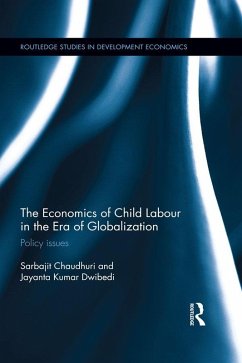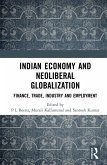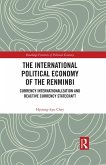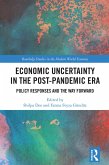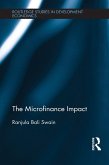Sarbajit Chaudhuri, Jayanta Kumar Dwibedi
The Economics of Child Labour in the Era of Globalization (eBook, PDF)
Policy issues
45,95 €
45,95 €
inkl. MwSt.
Sofort per Download lieferbar

23 °P sammeln
45,95 €
Als Download kaufen

45,95 €
inkl. MwSt.
Sofort per Download lieferbar

23 °P sammeln
Jetzt verschenken
Alle Infos zum eBook verschenken
45,95 €
inkl. MwSt.
Sofort per Download lieferbar
Alle Infos zum eBook verschenken

23 °P sammeln
Sarbajit Chaudhuri, Jayanta Kumar Dwibedi
The Economics of Child Labour in the Era of Globalization (eBook, PDF)
Policy issues
- Format: PDF
- Merkliste
- Auf die Merkliste
- Bewerten Bewerten
- Teilen
- Produkt teilen
- Produkterinnerung
- Produkterinnerung

Bitte loggen Sie sich zunächst in Ihr Kundenkonto ein oder registrieren Sie sich bei
bücher.de, um das eBook-Abo tolino select nutzen zu können.
Hier können Sie sich einloggen
Hier können Sie sich einloggen
Sie sind bereits eingeloggt. Klicken Sie auf 2. tolino select Abo, um fortzufahren.

Bitte loggen Sie sich zunächst in Ihr Kundenkonto ein oder registrieren Sie sich bei bücher.de, um das eBook-Abo tolino select nutzen zu können.
This book attempts to delve into many of the important aspects of child labour theoretically, and suggest policies which could indeed be useful in dealing with the problem under diverse situations using alternative multi-sector general equilibrium models.
- Geräte: PC
- mit Kopierschutz
- eBook Hilfe
- Größe: 1.5MB
Andere Kunden interessierten sich auch für
![The Singapore Economy (eBook, PDF) The Singapore Economy (eBook, PDF)]() The Singapore Economy (eBook, PDF)39,95 €
The Singapore Economy (eBook, PDF)39,95 €![Indian Economy and Neoliberal Globalization (eBook, PDF) Indian Economy and Neoliberal Globalization (eBook, PDF)]() Indian Economy and Neoliberal Globalization (eBook, PDF)42,95 €
Indian Economy and Neoliberal Globalization (eBook, PDF)42,95 €![The International Political Economy of the Renminbi (eBook, PDF) The International Political Economy of the Renminbi (eBook, PDF)]() Hyoung-Kyu CheyThe International Political Economy of the Renminbi (eBook, PDF)43,95 €
Hyoung-Kyu CheyThe International Political Economy of the Renminbi (eBook, PDF)43,95 €![Migration of Labour in India (eBook, PDF) Migration of Labour in India (eBook, PDF)]() Himmat RatnooMigration of Labour in India (eBook, PDF)42,95 €
Himmat RatnooMigration of Labour in India (eBook, PDF)42,95 €![Economic Uncertainty in the Post-Pandemic Era (eBook, PDF) Economic Uncertainty in the Post-Pandemic Era (eBook, PDF)]() Economic Uncertainty in the Post-Pandemic Era (eBook, PDF)43,95 €
Economic Uncertainty in the Post-Pandemic Era (eBook, PDF)43,95 €![The Microfinance Impact (eBook, PDF) The Microfinance Impact (eBook, PDF)]() Ranjula Bali SwainThe Microfinance Impact (eBook, PDF)52,95 €
Ranjula Bali SwainThe Microfinance Impact (eBook, PDF)52,95 €![The China-US Trade War (eBook, PDF) The China-US Trade War (eBook, PDF)]() Guoyong LiangThe China-US Trade War (eBook, PDF)22,95 €
Guoyong LiangThe China-US Trade War (eBook, PDF)22,95 €-
-
-
This book attempts to delve into many of the important aspects of child labour theoretically, and suggest policies which could indeed be useful in dealing with the problem under diverse situations using alternative multi-sector general equilibrium models.
Dieser Download kann aus rechtlichen Gründen nur mit Rechnungsadresse in A, B, BG, CY, CZ, D, DK, EW, E, FIN, F, GR, HR, H, IRL, I, LT, L, LR, M, NL, PL, P, R, S, SLO, SK ausgeliefert werden.
Produktdetails
- Produktdetails
- Verlag: Taylor & Francis eBooks
- Seitenzahl: 192
- Erscheinungstermin: 14. Oktober 2016
- Englisch
- ISBN-13: 9781315397498
- Artikelnr.: 46883424
- Verlag: Taylor & Francis eBooks
- Seitenzahl: 192
- Erscheinungstermin: 14. Oktober 2016
- Englisch
- ISBN-13: 9781315397498
- Artikelnr.: 46883424
- Herstellerkennzeichnung Die Herstellerinformationen sind derzeit nicht verfügbar.
Sarbajit Chaudhuri is Professor with the Department of Economics, University of Calcutta, Kolkata, India. He received his PhD in 1995 from the Jadavpur University, Kolkata, working under the supervision of Professor Manash Ranjan Gupta. He has published more than 75 research papers in journals of international repute, such as Journal of Development Economics, Economica, International Review of Economics and Finance, Metroeconomica, Review of International Economics, Review of Development Economics, Economic Modelling, Research in Economics, Japan and the World Economy, Pacific Economic Review, The Japanese Economic Review, The Manchester School, Bulletin of Economic Research, Journal of International Trade and Economic Development, Review of Urban and Regional Development Studies and The Economics of Transition, among others.
He has also authored books titled Foreign Direct Investment in Developing Countries: A Theoretical Evaluation (2014), Revisiting the Informal Sector: A General Equilibrium Approach (2010) and Some Aspects of Agricultural Credit in a Developing Economy (2004). He has served on the editorial boards of many journals. For his work, he was made an honorary member of the Canadian Economic Association in 2006. His areas of interest include development economics, international trade, labour economics, agricultural economics and applied microeconomics.
Jayanta Kumar Dwibedi is Associate Professor of Economics at Brahmananda Keshab Chandra College, Kolkata, India. He obtained his PhD from the University of Calcutta, India, in 2008, working under the supervision of Professor Sarbajit Chaudhuri. With his specialization in trade and development and labour economics, he has published a number of research articles in many renowned international and national journals such as International Review of Economics and Finance, The Manchester School, Bulletin of Economic Research, Research in Economics, Review of Development Economics and Economic and Political Weekly. His current research interests include development economics, labour economics and issues related to public finance and public policy. Recently, he has completed two collaborative studies (with CTRPFP, CSSSC) for the Central Finance Commission, India, and the State Finance Commission of West Bengal, India.
He has also authored books titled Foreign Direct Investment in Developing Countries: A Theoretical Evaluation (2014), Revisiting the Informal Sector: A General Equilibrium Approach (2010) and Some Aspects of Agricultural Credit in a Developing Economy (2004). He has served on the editorial boards of many journals. For his work, he was made an honorary member of the Canadian Economic Association in 2006. His areas of interest include development economics, international trade, labour economics, agricultural economics and applied microeconomics.
Jayanta Kumar Dwibedi is Associate Professor of Economics at Brahmananda Keshab Chandra College, Kolkata, India. He obtained his PhD from the University of Calcutta, India, in 2008, working under the supervision of Professor Sarbajit Chaudhuri. With his specialization in trade and development and labour economics, he has published a number of research articles in many renowned international and national journals such as International Review of Economics and Finance, The Manchester School, Bulletin of Economic Research, Research in Economics, Review of Development Economics and Economic and Political Weekly. His current research interests include development economics, labour economics and issues related to public finance and public policy. Recently, he has completed two collaborative studies (with CTRPFP, CSSSC) for the Central Finance Commission, India, and the State Finance Commission of West Bengal, India.
Foreword
Preface
1 A survey of literature on child labour
2 Derivation of supply functions of child labour from household behaviour
3 Trade sanction and child labour
4 Why do composite policies sometimes fail?
5 Is the reduction of poverty a necessity?
6 Agricultural dualism, subsidy policies and child labour
7 Child labour, human capital formation and the possibility of failure of
incentive-based schemes
8 Economic growth and domestic child labour
9 Policy implications of results and sketching the future path of research
on child labour
Index
Preface
1 A survey of literature on child labour
2 Derivation of supply functions of child labour from household behaviour
3 Trade sanction and child labour
4 Why do composite policies sometimes fail?
5 Is the reduction of poverty a necessity?
6 Agricultural dualism, subsidy policies and child labour
7 Child labour, human capital formation and the possibility of failure of
incentive-based schemes
8 Economic growth and domestic child labour
9 Policy implications of results and sketching the future path of research
on child labour
Index
Foreword
Preface
1 A survey of literature on child labour
2 Derivation of supply functions of child labour from household behaviour
3 Trade sanction and child labour
4 Why do composite policies sometimes fail?
5 Is the reduction of poverty a necessity?
6 Agricultural dualism, subsidy policies and child labour
7 Child labour, human capital formation and the possibility of failure of
incentive-based schemes
8 Economic growth and domestic child labour
9 Policy implications of results and sketching the future path of research
on child labour
Index
Preface
1 A survey of literature on child labour
2 Derivation of supply functions of child labour from household behaviour
3 Trade sanction and child labour
4 Why do composite policies sometimes fail?
5 Is the reduction of poverty a necessity?
6 Agricultural dualism, subsidy policies and child labour
7 Child labour, human capital formation and the possibility of failure of
incentive-based schemes
8 Economic growth and domestic child labour
9 Policy implications of results and sketching the future path of research
on child labour
Index
